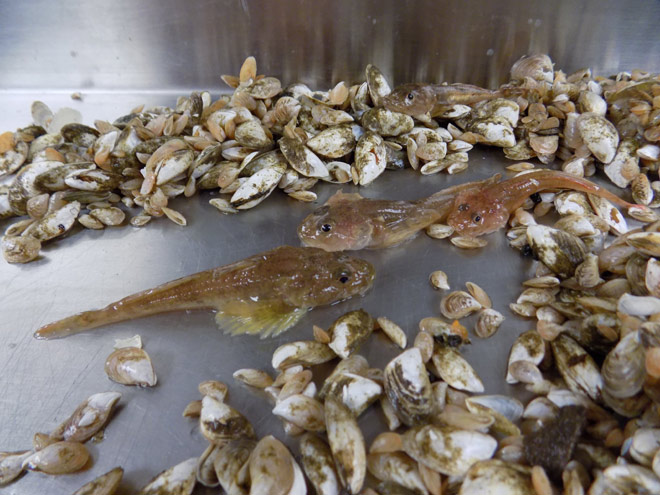FOR IMMEDIATE RELEASE
December 9, 2015
Contacts
Lake Michigan’s rapidly changing ecosystem

Quagga mussels and deepwater sculpin collected in a benthic trawl on board the USGS R/V Sturgeon, offshore of Grand Haven, Michigan, as part of the July 2015 Cooperative Science and Monitoring Initiative (CSMI) research. Credit: NOAA
Ann Arbor, Mich. — A new special issue of the Journal of Great Lakes Research highlights the direct and indirect impacts of nonindigenous species on the Lake Michigan ecosystem. Guest editors are Henry A. Vanderploeg (GLERL), David B. Bunnell, (USGS Great Lakes Science Center), Hunter Carrick (Central Michigan University), and Tomas O. Höök (Purdue University)
Twenty-two papers found in this special issue address the full breadth of the direct and indirect impacts of nonindigenous species on the Lake Michigan ecosystem.
Topics within the issue focus on how a rapid increase in the number of invasive species coupled with long-term reductions in nutrient inputs (due to the success of nutrient abatement programs and other water-quality management decisions) have impacted Lake Michigan. Themes and topics covered within the supplement are:
- Cladophora modeling and nutrient management
- Quagga mussel population status and impacts
- Status and changes to the microbial food web
- Mesozooplankton trends and trophic structure
- Population dynamics and impacts of Bythotrephes
- Fish diet, recruitment, and ecology
- Synthesis of food web changes
"The proliferation of invasive species coupled with a nutrient abatement program have contributed to changes to the Lake Michigan ecosystem," notes Dr. Henry Vanderploeg, guest editor and researcher from NOAA’s Great Lakes Environmental Research Laboratory. "These changes have had serious consequences to fisheries, water quality, and ecosystem and human health. We describe these changes, attempt to explain them, and point out research directions necessary to understand and forecast this valuable resource."
The idea for the supplement stemmed from various stakeholder meetings throughout the region, which brought together an assortment of studies and papers regarding many aspects of the Lake Michigan food web. Upon assessment of these studies, it became apparent that further research is needed in many areas of ecology to understand the Lake Michigan food web response and predict the impacts of a variety of stressors.
The understandings and topics within this issue are not isolated to Lake Michigan, however. Other Laurentian Great Lakes (especially lakes Huron and Ontario) share key members of the food web, as well as similarities in their changing nutrient and climate dynamics, making this issue highly relevant throughout the entire Great Lakes region.
Original Publication Information
in Volume 41, Issue S3 of the Journal of Great Lakes Research, published by Elsevier, 2015. This special issue is titled Complex interactions in Lake Michigan's rapidly changing ecosystem.
Contacts
For more information about the study, contact Henry A. Vanderploeg, NOAA Great Lakes Environmental Research Laboratory, 4840 S. State Rd., Ann Arbor, MI 48108; 734-741-2284; [email protected].
For information about the Journal of Great Lakes Research, contact Stephanie Guildford, Scientific Co-Editor, Large Lakes Observatory, University Minnesota Duluth, 2205 East Fifth Street, Duluth, Minnesota, 55812-2401; [email protected]; (218) 726-8064.
